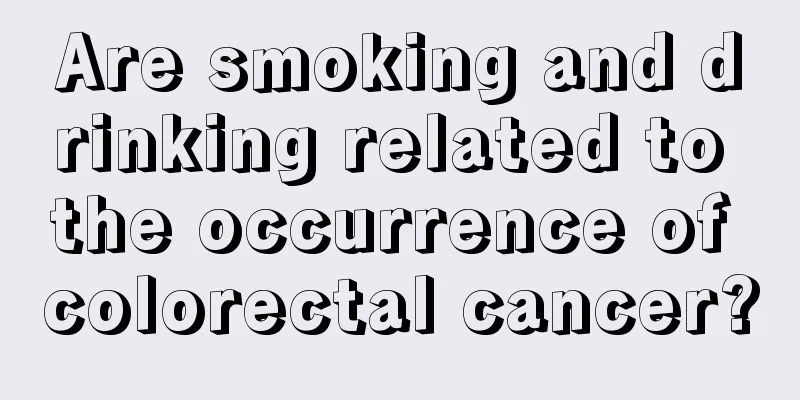Are smoking and drinking related to the occurrence of colorectal cancer?

|
As we all know, smokers are prone to lung cancer, urinary system tumors and cardiopulmonary diseases. Regarding the relationship between smoking and colorectal cancer, early studies believed that smoking does not increase the risk of colorectal cancer; however, with the deepening of research, we now find that smoking increases the incidence of colorectal cancer. Of course, this effect is not reflected in the short term, but it will take more than ten years to show. Studies have found that smokers who have smoked for more than 20 years are three times more likely to develop colorectal adenomatous polyps than non-smokers, and twice as likely to develop colorectal cancer as non-smokers. As the age of smoking increases, the risk of colorectal cancer also increases. Although the relationship between smoking and canine intestinal cancer is not as close as that between smoking and lung cancer, there is still a close relationship between them. It can be said that quitting smoking can effectively reduce the incidence of colorectal cancer. The mechanism of action of smoking inducing colorectal cancer has not yet been fully understood. It may be that during smoking, the carcinogens produced by tobacco enter the large intestine through the blood circulation and induce intestinal cell cancer, or that the carcinogens produced by tobacco mix with food residues in the mouth and enter the intestine to induce intestinal cell cancer. There has been a long-standing debate about the relationship between drinking and colorectal cancer. In 1957, foreign countries first reported that people who drink beer every day have an increased risk of colorectal cancer compared to non-drinkers, but the conclusion was that there was no obvious relationship between the two. There have been many various studies at home and abroad that have tried to prove the relationship between drinking and colorectal cancer, but the results are very different. Therefore, it is believed that drinking has different effects on the occurrence of colorectal cancer in different races and populations. The British Committee on the Carcinogenicity of Chemicals in Food, Consumer Products and the Environment also pointed out that there is not enough evidence to show that there is a causal relationship between colorectal cancer and drinking. However, a recent Japanese study found that drinking can increase the incidence of colorectal cancer, especially rectal cancer. Although we cannot give a very definite conclusion here, based on various existing studies, we believe that drinking is a pathogenic factor for the occurrence of human colorectal cancer, and its effect may be indirect and local. Therefore, drinking less or even not drinking is still helpful in preventing colorectal cancer. In short, smoking and drinking still have an impact on the occurrence of colorectal cancer. In order to reduce the incidence of colorectal cancer, it is also very important to advocate smoking control and less drinking and maintain good living habits. |
<<: Is the incidence of colorectal cancer related to environmental factors?
>>: How do patients with esophageal cancer eat after radiotherapy
Recommend
Can renal hamartoma be dissolved by taking Chinese medicine?
Renal hamartoma is a benign tumor that usually do...
Subcutaneous soft tissue mass
Nowadays, many people often have subcutaneous sof...
Pay more attention to diet when treating rectal cancer
As one of the digestive tract diseases, the treat...
What are the usual treatment measures for gallbladder cancer?
Gallbladder cancer is a common disease in our dai...
Methods in the wine making process
Wine is a very famous red wine. Many people love ...
Tips for making shoes look bigger if they are one size smaller
Nowadays, the convenience of online shopping make...
How to diagnose uterine cancer
Only by checking for endometrial cancer can it be...
How to treat cervical stiffness?
Cervical spondylosis, also known as cervical arth...
6 ways to save yourself in an air crash
Many industry insiders believe that the first one...
Normal ferritin value
Ferritin is a histolytic protein that stores iron...
Explain the symptoms of late-stage prostate cancer before death
Symptoms before death in late stage of prostate c...
How to prevent lung cancer? Do these things
The first thing to prevent lung cancer is to stay...
Will anal fissure continue to bleed? How to relieve it?
Blood in the stool is one of the symptoms of anal...
Does atrial fibrillation have to be treated with medication?
Atrial fibrillation is a professional term that m...
How to relieve itching after tattoo
In the past, Chinese people were very taboo about...









